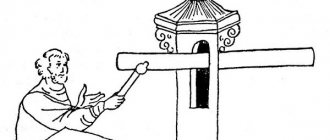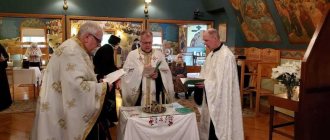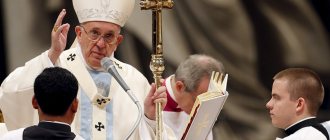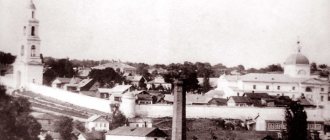2.2.Christmas
Christmas is a quiet, homely, calm holiday. This is a spiritual holiday. Only family members and closest friends gather at the table.
According to the Old Testament prophets, Christ was born in the city of Bethlehem. The shepherds were the first to know about his birth. Having accepted this news with all their hearts, they went to worship the baby. Eastern sages - the Magi, who also believed in Christ, undertook a difficult journey to the place of his birth. But there were also those like King Herod, who wished his death. When he realized that his plan to find the baby had not come true, he ordered the killing of all boys two years old and younger in Bethlehem and its environs. He hoped that among those killed would be the Infant God, in whom he saw a contender for the royal throne. This is how 14,000 babies were killed. They are considered the first martyrs for Christ.
Christmas is one of the most beautiful and solemn Christian holidays. Throughout the Christian world, including in Rus', Christmas has always been celebrated with special reverence. On this day, decorated Christmas trees stand everywhere, symbolizing the gospel tree, candles burn, like those that burned in the Bethlehem stable. In many countries, on Christmas night, children take to the streets singing carols. Christmas Eve is called "Christmas Eve". The evening of January 6 was also called “Carols”. Christmas Eve is the final day of the Nativity Fast. The church charter prescribes a strict fast on this day with complete abstinence from food “until the first star,” symbolizing the Christmas star that announced the birth of Christ to the Magi. The name “Christmas Eve” comes from the word “sochivo”, which was the name of the ritual dish required that evening. It was prepared from poppy or almond “milk” mixed with honey, and porridge from red wheat or barley, rye, buckwheat, peas, and lentils. Whole or crushed kernels of walnuts, sweet almonds, and ground poppy seeds were added there. This dish began the meal on both Christmas and Epiphany Eve.
Christmas Eve in the Christian world is considered exclusively a family dinner. On this day, peace, love and harmony reign in the house. In the old days, the table was sprinkled with hay, then a tablecloth was laid out, and a dish with soch and other dishes was placed in the center of the table. There were enough drinks, both soft and strong. During these festive evening hours, a solemn service was held in the churches.
In the old days, when the clock struck midnight, everyone exchanged gifts, congratulated each other, and made wishes. After all, it was believed that at Christmas the sky opens to the earth, and the heavenly forces fulfill all their plans. But desires must be good. The day after Christmas is dedicated to the Mother of Christ the Savior, the Most Pure Virgin Mary. From the gathering of believers to the temple to glorify and give thanks to Her, this day is called the Council of the Most Holy Theotokos. The twelve days after Christmas are called holy days or Christmastide (until January 17). Fasting is canceled on these days. Christmas time is not only about joy and fun. Our pious ancestors did works of mercy on Christmastide, following the Savior’s commandment: “Be merciful, just as your Father is merciful” (Luke 6:36).
Christian calendar
The chronology system most common in the Western world is based on the estimated date of birth of Jesus Christ: the common Latin abbreviation AD, derived from Anno Domini, means “from the Nativity of Christ,” or “AD,” and BC (Before Christ) means “before Christ.” era". But later research suggests that Jesus was most likely born in the fourth rather than the first year of our era. The Christian chronology system became widespread only from the 8th century. Before this, the church used the date of the founding of Rome, 753 BC, as the starting point.
2.4. Baptism
Epiphany is one of the main Christian holidays. The holiday of Epiphany ends the Christmas holidays, which last from January 7 to January 19. The holiday begins on the evening of January 18, when all Orthodox Christians celebrate Epiphany Eve.
The holiday of Epiphany is celebrated every year on January 6 for Catholics and January 19 for Orthodox believers, according to the official modern calendar. This holiday is associated with the baptism of Jesus Christ in the Jordan River. During his earthly life, only adults were baptized who fully felt faith in one God and realized in themselves this, at that time new, religion, because at that time Christians were persecuted and monotheism was rejected. Therefore, it is not surprising that Jesus Christ was baptized at the age of 30.
In churches, water is blessed on this day. Previously, it was taken from the nearest river or lake by drilling a hole in the ice in the shape of a large cross. The priest prayed over the water, lowered a church cross into the hole, and parishioners of the nearest church sang psalms. After all these actions, the water in the river was considered baptized. It was collected into various vessels and carried home. They believed that such water healed various ailments, gave vigor and health, so the custom of plunging into ice holes was widespread. Currently, water is practically not taken from rivers and lakes - the ecology is not the same. It is immediately poured after the service near the church. Agree - this is very practical. The custom of plunging into an ice hole has survived to this day.
In addition to cooling mortal bodies, water was also used in the active struggle against various evil spirits, which “besieged” houses in armies. In order to drive out this very household evil spirits from the corners, they sprinkled baptized water on all rooms, the courtyard and outbuildings. After such rituals, each person tried to drink plenty of holy water in order to be healthy, happy, and therefore carefree and cheerful all year. At least, drinking this water, many dreamed about it and hoped only for the best.
For Catholics, Epiphany coincides with the Feast of the Three Kings - the three wise men who were the first to convey the news of the birth of Christ to the whole world. On this holiday, every Catholic brings chalk from the church to the “pasvenchans” and writes three letters on the doors of the house: “K, M and B”, according to the names of the Three Kings - Kaspel, Melchon and Baltosar, respectively. They believe that these letters drive away evil forces and evil thoughts from the house and from the well-being of the family living in it. Chalk is stored all year, like water for the Orthodox. Only, in this case, chalk acts as a cure for abdominal pain. Why is that? In fact, no one will really answer. Maybe faith plays the main role here? Baptism was not celebrated with large festivities, except for the third kutya that fell on it. But it was also called Lenten. There are no songs, fortune telling, round dances or special dances associated with this holiday. It just happened that way. In contrast to this, there are a lot of beliefs and signs associated with Baptism.
For example, the owners tried to come home first after the service. It was believed that they would be the first to reap the harvest. The hay on which kutya stood during Kolya was gradually given to domestic animals as a remedy for illnesses and the not-so-good influence of witches. There are long queues for holy water in the courtyards of temples. If for some serious reason a person cannot go to service or lives a thousand kilometers from the nearest church, he can resort to the healing power of simple water taken from an ordinary reservoir on Epiphany night, although such water cannot actually be considered holy. On the feast of the Epiphany of the Lord, the water in churches is consecrated according to a special rite - the great Jordanian consecration and is called Epiphany. There is such a Greek word - “agiasma”, it is translated as shrine. And the attitude towards it, towards the great shrine, should be special.
Lent, Holy Week and Easter
During Holy Week, Christians remember the events surrounding the death and resurrection of Jesus. Holy Week ends with the Resurrection of Christ - Easter, which is the most important holiday of the Christian calendar.
The Catholic and Protestant churches celebrate Easter between March 23 and April 24. The Orthodox Church uses a different system for calculating the date of Easter.
Six weeks before Easter, Lent begins, during which Christians prepare for Holy Week, the remembrance of the death of Jesus Christ. For Catholics, fasting begins on Ash Wednesday. Ashes are an ancient symbol of grief and repentance. In many churches there was a ritual during which a mark of ash was made on the forehead of everyone present. Lent is a time of reflection and repentance, a reminder of the forty days Jesus spent in the desert in prayer and fasting.
During Holy Week, Christians remember the events of the last week of the life of Jesus Christ: His entry into Jerusalem on Palm Sunday, the Last Supper on Holy Thursday. Jesus was executed on Friday, which is called the Great Friday because Christians believe that Jesus willingly went to his death to show that God has addressed human suffering and is taking it upon Himself.
Easter Sunday commemorates the time the disciples learned that Jesus was alive, a time of great joy. Many churches hold an all-night vigil all Saturday night - a service during which the arrival of Easter is welcomed.
Table of holidays by month
For the 19th year, it is worth compiling a table of church celebrations, which will help you remember dates that are of special significance for believers.
| Winter: | Certain days are considered significant and are honored by Christians in a special way. This is January 7, 19, and also February 15. Christmas, as the beginning of a new life for humanity, Baptism and Candlemas. |
| Spring: | The beginning of spring remains without holidays, but in April - on the 7th, believers celebrate the Annunciation. In May, there are no fixed celebrations on the calendar. |
| Summer: | The Transfiguration is celebrated on August 19, the date of the death of the Mother of God is celebrated on August 28, we will talk about other celebrations later. |
| Autumn: | Believers consider the following days special: September 21 and 27. |
| Transitional: | January 14: religious people celebrate the Circumcision of the Lord, on July 7 they celebrate the birth of John the Baptist, then the day of Peter and Paul - July 12, but believers celebrate the truncation of the head of John the Baptist on September 11, and the Intercession falls on October 14. |
In the church calendar, celebrations are replaced by fasts; if we talk about holidays, they are always preceded by “abstinence.” Believers not only honor the traditions and customs of the church, but also celebrate the end of Lent, honor the saints and pay tribute to their deeds.
Remembering all the events is not so easy, especially for those who are not religious. A calendar to which clergy make changes annually can help with this.
Varieties of religious Orthodox festivals
As mentioned earlier, celebration days may change the date of the event, or may remain unchanged. Easter is considered the main holiday for believers.
Easter
This great holiday is considered mobile; it is celebrated on the first Sunday after the full moon, which occurs no earlier than the conventional equinox, which falls on March 21.
Attention! The holiday is celebrated in honor of the resurrection of the Son of God. But Catholics and Orthodox Christians celebrate it on different days, but often the dates coincide.
Twelfth holidays
They are divided into moving and non-moving; these are days that are considered special. There are a total of 12 holidays, in addition to Easter, on which believers honor the events that happened to Jesus Christ during his earthly life.
Five Great Non-Twelfth Holidays
These are those whose date does not change.
- Cover;
- Circumcision – celebrated in Orthodoxy and Catholicism;
- Birth of John the Baptist;
- Saints Peter and Paul's Day;
- Truncation.
In Russia they also celebrate the day of St. Sergei of Radonezh.
Any Sunday of the year
It is also considered a holiday, since at this time it is prohibited:
- Do hard work.
- Give in to despair.
From time immemorial, Sunday is a day off. Believers gathered for morning services in the church. As it is written in the Bible, the Lord worked for 6 days, and made the 7th a day off.
For this reason, Sunday is considered special, and worship is considered festive.
Middle holidays
Not so important, but still revered by believers, are days on which the main saints are remembered. On middle holidays, it is customary to venerate events that were significant for church life, icons and relics that are in the temple. The exact number of such significant dates has not been established; some of them are celebrated at the request of the abbot.
Small holidays
We are talking about the dates on which saints are venerated. Almost every day of the calendar can be called a holiday. But these holidays are considered minor and are celebrated only with worship. Often there are 2-3 such celebrations on one day.
Transitional
That is, they are mobile, every year the day of the solemn event changes and shifts.
Intransient
The date does not change, it remains the same from year to year.
Pentecost (in Orthodoxy - Trinity)
Celebrated on the seventh Sunday after Easter. When Jesus said goodbye to his disciples for the last time after his resurrection, he promised to send them a “helper” or “comforter” who would remain with them forever. As they gathered together to celebrate the Jewish Pentecost, they heard a sound like the roar of the wind and saw flames on each of them. They also discovered that they could speak other languages and heal the sick in the name of Christ. Christians believed that all this was from the Holy Spirit, who would always be with them and who was the active force of God in the world.









